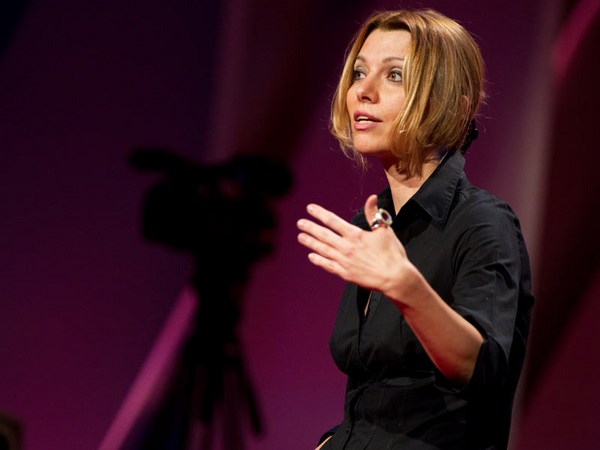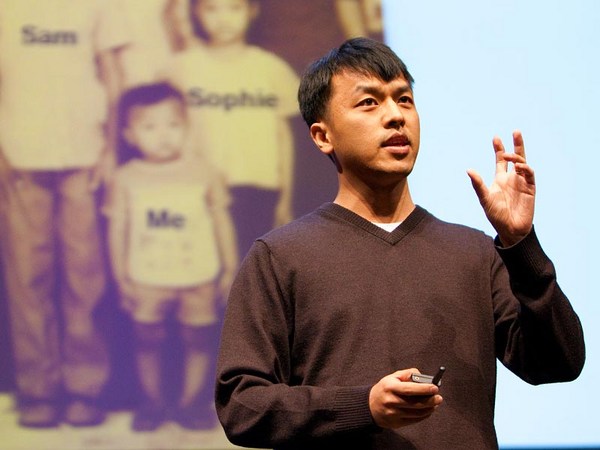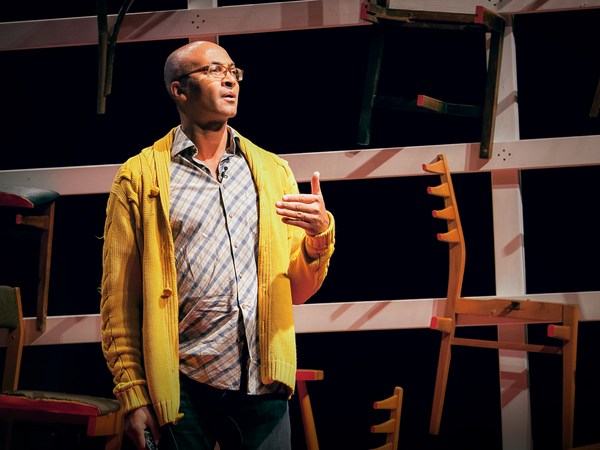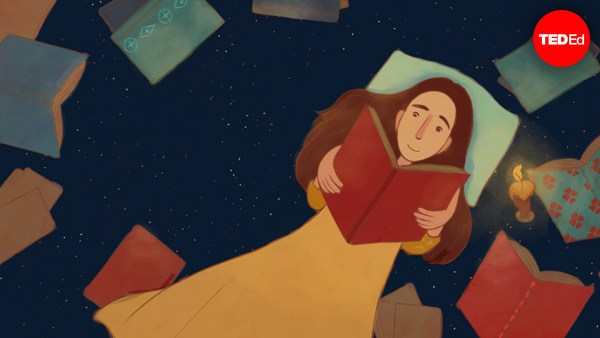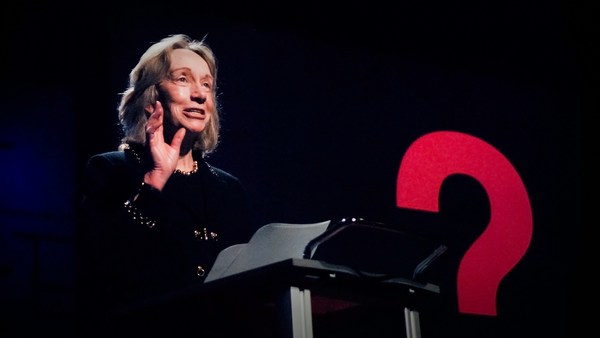I am the daughter of a forger, not just any forger ... When you hear the word “forger,” you often think “mercenary.” You think “forged currency,” “forged pictures.” My father is no such man. For 30 years of his life, he forged papers -- never for himself, always for other people, and to helpf the persecuted and the oppressed. Let me introduce him. Here is my father at age 19. It all began for him during World War II, when, aged 17, he found himself thrust into a forged documents workshop. He quickly became the forged paper expert of the Resistance. And this story became special as after the Liberation, he went on forging papers until the ’70s.
When I was a child, I knew nothing about this, of course. This is me, in the middle, making faces. I grew up in the Paris suburbs and I was the youngest of three children. I had a "normal" dad like everybody else, apart from the fact he was 30 years older than ... well, he was basically old enoug to be my grandfather. Anyway, he was a photographer and a street educator, and he always taught us to strictly obey the laws. And, of course, he never talked about his past life when he was a forger.
But there was an episode, I will tell you about, that might have tipped me off. I was in high school and got a bad grade, a rare event for me, so I decided to hide it from my parents. And to do that, I thought I would forge their signature. I started working on my mother’s signature, because my father’s one is absolutely impossible to forge. So, I got working, I took some sheets of paper and started practicing, practicing, practicing, until I reached what I thought was a steady hand, and went into action. Later, while checking my school bag, my mother found my assignment and saw the signature was forged. She yelled at me like never before. I went to hide in my bedroom, under the blankets, and then I waited for my father to come back from work with, one could say, much apprehension. I heard him come in. I remained under the blankets He entered my room, sat on the corner of the bed, and he was silent, so I pulled the blanket from my head, and when he saw me, he started laughing. He was laughing so hard, he could not stop, holding my assignment. Then he said, “Really, Sarah, you could have worked harder! It’s too small!” Indeed, it's rather small.
I was born in Algeria. There I would hear people say my father was a “moudjahid” and that means "fighter." Later on, in France, I loved eavesdroppin on grownups’ conversations, and I would hear all sorts of stories about my father’s former life, especially that he had “done” World War II, that he had "done" the Algerian war. In my head, I thought that “doing” a war meant being a soldier. But knowing my father, and how was a non-violent keen pacifist, I found it very hard to picture him with a helmet and gun. And indeed, I was very far from the mark.
One day, while my father was working on a file for us to obtain French nationality, I happened to see some documents. These are real! These are mine, I was born an Argentinean. But the document I happened to see, that would help us build a case for the authorities, was a document from the army thanking my father for his work on behalf of the secret services. And then, suddenly, I went "wow!" My father, a secret agent? It was very James Bond. I wanted to ask him questions, which he didn’t answer. And later, I told myself that one day I would have to question him. By then I was a mother of a little boy and thought it was now time, that he absolutely had to talk to us. I had just become a mother and he was celebrating his 77th birthday, and suddenly I was very, very afraid. I feared he'd go and take his silences with him, and take his secrets with him. I managed to convince him that it was important for us, but possibly also for other people that he shared his story. And so he did and I made a book of it, from which I will read you some excerpts later.
Here’s his story: my father was born in Argentina. His parents were of Russian descent. The whole family came to settle in France in the ’30s. His parents were Jewish, Russian and above all, very poor. So at the age of 14, my father had to work. And with his only diploma, the primary school certificate, he found work at a dry cleaner’s. That’s where he discovered something totally magical, when he talks about it, it’s fascinating -- it's the magic of dyeing chemistry. that was during the war and his mother had been killed when he was 15. This coincided with the time when he threw himself body and soul into chemistry as it was the only consolation for his sadness. He would ask his boss many questions all day long, to learn, to gather more and more knowledge, and at night, when no one was looking, he'd put his experience to practice. He was mostly interested in ink bleaching.
All this to tell you that if my father became a forger, actually, it was almost by accident. His family was Jewish, so they were hunted down. They were all arrested eventually and taken to the Drancy camp. They got out at the last minute thanks to their Argentinean papers. They were out, but still in danger. The “Jew” stamp was still on their papers. It was my grandfather who decided they needed forged documents. My father had been instilled with such respect for the law that although he was being persecuted, he’d never thought of forged papers. But it was he who went to meet a man from the Resistance.
Back then, documents had hard covers, they were filled in by hand, and they stated your job. In order to survive, he needed work. He asked the man to write "dyer." Suddenly, the man looked very, very interested. “As a “dyer,” do you know how to bleach ink marks?” Of course, he knew. Suddenly, the man started explaining that actually the whole Resistance had a huge problem: even the top experts could not manage to bleach an ink called “indelible,” the "Waterman" blue ink. And my father immediately replied that he knew exactly how to bleach it. The man was very impressed with this 17-year-old who could immediately give him the formula, so he recruited him. Unknowingly, my father had just invented something you find in every schoolchild’s pencil case: the so-called "correction pen." (Applause)
But it was only the beginning. That's my father. As soon as he got to the lab, though he was the youngest, he immediately saw there was a problem with the making of forged documents. All the groups would stop at falsifying.. But demand was ever-growing and it was difficult to tamper with existing documents. He thought they should be made from scratch. He started a press and started photoengraving. He started making rubber stamps, inventing all kind of things -- he invented a centrifuge using a bicycle wheel. Anyway, he had to do all this because he was completel obsessed with output. He had made a simple calculation: In one hour, he could make 30 forged documents. If he slept one hour, 30 people would die.
This sense of responsability for other people’s lives when he was just 17 -- and also his guilt for being a survivor, since he had escaped the camp when his friends had not -- stayed with him all his life. And this is maybe explains why, for 30 years, he continued to make false papers at the cost of every sacrifice. I'd like to talk about those sacrifices, because there were many. There were obviously financial sacrifices because he always refused to be paid. To him, being paid would have meant being a mercenary. If he had accepted payment, he wouldn't be able to say "yes" or "no" depending on what he deemed a just or unjust cause. So he was a photographer by day, and a forger by night for 30 years. He was broke all of the time.
Then there were the emotional sacrifices: How can one live with a woman while having so many secrets? How can one explain what one does at night in the lab, every single night? Of course, there was another kind of sacrifice involving his family that I understood much later. One day my father introduced me to my sister. He also explained to me that I had a brother, too, and the first time I saw them I must have been three or four, and they were 30 years older than me. They are both in their sixties now.
In order to write the book, I asked my sister questions. I wanted to know who my father was, who was the father she had known. She explained that the father that she’d had would tell them he’d come and pick them up on Sunday to go for a walk. They would get all dressed up and wait for him, but he would almost never come. He'd say, "I'll call." He wouldn't call. And then he would not come. Then one day he totally disappeared. Time passed, and they thought he had surely forgotten them, at first. Then as time passed, after almost two years, they thought, "Well, perhaps our father has died." And then I understood that asking my father so many questions was stirring up a whole past he probably didn’t feel like talking about because it was painful. And while my half brother and sister thought they’d been abandoned, orphaned, my father was making false papers. And if he did not tell them, it was of course to protect them.
After the Liberation, he made false papers so the survivors of concentration camps could immigrate to Palestine before the creation of Israel. As he was a staunch anti-colonialist, he made false papers for Algerians during the Algerian war. After the Algerian war, at the heart of the internationa resistance movements, his name circulated and the whole world came knocking at his door. In Africa there were countrie fighting for their independence: Guinea, Guinea-Bissau, Angola. And then my father connected with Nelson Mandela’ anti-apartheid party. He made forged papers for persecuted black South Africans.
There was also Latin America. My father helped those who resisted dictatorships in the Dominican Republic, Haiti, and then it was the turn of Brazil, Argentina, Venezuela, El Salvador, Nicaragua, Colombia, Peru, Uruguay, Chile and Mexico. Then there was the Vietnam War. My father made forged papers for the American deserters who refused to take up arms against the Vietnamese. Europe was not spared either. My father made forged papers for the dissidents against Franco in Spain, Salazar in Portugal, against the colonels’ dictatorship in Greece, and even in France. There, just once, it happened in May of 1968. My father watched, benevolently, of course, the demonstrations of the month of May, but his heart was elsewhere, and so was his time because he had over 15 countries to serve.
Once, though, he agreed to make false papers for someone you might recognize. (Laughter) He was much younger in those days, and my father agreed to make false papers to enable him to come back and speak at a meeting. He told me that those false papers were the most media-relevant and the least useful he’d had to make in all his life. But, he agreed to do it, even though Daniel Cohn-Bendit’s life was not in danger, just because it was a good opportunity to mock the authorities, and to show them that there’s nothin more porous than borders -- and that ideas have no borders.
All my childhood, while my friends’ dads would tell them Grimm’s fairy tales, my father would tell me stories about very unassuming heroes with unshakeable utopias who managed to make miracles. And those heroes did not need an army behind them. Anyhow, nobody would have followed them, except for a handful [of] men and women of conviction and courage. I understood much later that it was his own story my father would tell me to get me to sleep. I asked him whether, considering the sacrifices he had to make, he ever had any regrets. He said no. He told me that he would have been unable to witness or submit to injustice without doing anything. He was persuaded, and he's still convinced that another world is possible -- a world where no one would ever need a forger. He's still dreaming about it. My father is here in the room today. His name is Adolfo Kaminsky and I’m going to ask him to stand up. (Applause) Thank you.

